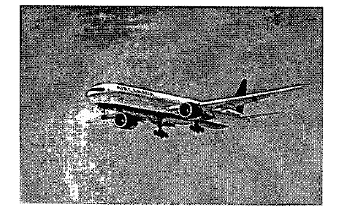Carbon monoxide emitted by automobiles is an environmental hazard . A car has an engine of four cylinders with a total cylinder volume of 1600 cc and a fuel consumption fo 7.0 dm3 per 100 Km , when driving at an average speed of 80 km/hr . In one second , each cylinder goes through 25 burn cycles and consumes 0.400g of fuel . The compression ratio, which is the ratio between the smallest and largest volume within the cylinder as the piston moves forward and backward is 1:8.
Calculate the air intake of the engine (m3S−1) , if the gaseous fuel and air are introduced into the cylinder when its volume is largest until the pressure is 101.0 KPa. the temperature of both incoming air and fuel is 100∘C. (Assume the fuel to be isoctane , C8H18)
The correct Answer is:Air constains 21.0% of O2 and 79.0% of N2 (by volume) . It is assumed that 10.0% of the carbon of the fuel forms CO upon combustion and that N2 in air remains insert.
To calculate the air intake of the engine in m3/s, we will follow these steps:
Step 1: Calculate the total fuel consumption per second
Given that the car consumes 0.400 g of fuel per burn cycle and each cylinder goes through 25 burn cycles per second, we can calculate the total fuel consumption per second for all four cylinders.
Total fuel consumption per second=Fuel per cycle×Burn cycles per second×Number of cylinders
=0.400g/cycle×25cycles/s×4cylinders=40g/s
Step 2: Convert fuel consumption to moles
The molar mass of iso-octane C8H18 is approximately 114.22 g/mol. We can convert the fuel consumption from grams to moles.
Moles of fuel per second=Total fuel consumption per secondMolar mass of iso-octane=40g/s114.22g/mol≈0.350mol/s
Step 3: Determine the stoichiometric air requirement
The combustion reaction for iso-octane is:
C8H18+12.5O2→8CO2+9H2O
From the reaction, we see that 1 mole of iso-octane requires 12.5 moles of O2. Since air is approximately 21% oxygen by volume, we can calculate the volume of air required.
Moles of air required=12.5moles of O2×10.21≈59.52moles of air
Step 4: Calculate the air intake in moles per second
Now we can calculate the moles of air required per second based on the moles of iso-octane consumed.
Moles of air per second=Moles of fuel per second×59.52≈0.350mol/s×59.52≈20.82mol/s
Step 5: Convert moles of air to volume
Using the ideal gas law, we can calculate the volume of air at the given conditions (temperature and pressure). We will use the ideal gas equation:
PV=nRT
Where:
- P=101.0kPa=101000Pa
- n=20.82mol/s
- R=8.314J/(mol K)
- T=100°C=373.15K
Rearranging for V:
V=nRTP
Substituting the values:
V=20.82mol/s×8.314J/(mol K)×373.15K101000Pa≈0.052m3/s
Final Answer
The air intake of the engine is approximately 0.052m3/s.
---
Given that the car consumes 0.400 g of fuel per burn cycle and each cylinder goes through 25 burn cycles per second, we can calculate the total fuel consumption per second for all four cylinders.
The molar mass of iso-octane C8H18 is approximately 114.22 g/mol. We can convert the fuel consumption from grams to moles.
The combustion reaction for iso-octane is:
Now we can calculate the moles of air required per second based on the moles of iso-octane consumed.
Using the ideal gas law, we can calculate the volume of air at the given conditions (temperature and pressure). We will use the ideal gas equation:
- P=101.0kPa=101000Pa
- n=20.82mol/s
- R=8.314J/(mol K)
- T=100°C=373.15K
The air intake of the engine is approximately 0.052m3/s.
Topper's Solved these Questions
Similar Questions
Knowledge Check
- Question 1 - Select One
If the height and radii of the cylinder halved then the volume of the cylinder becomes ____
A8 times the original volumeB4 times the original volumeC18 time the original volumeDit will rename same - Question 2 - Select One
An aeroplane travelled a distance of 400km at an average speed of x km/hr. On the return journey, the speed was increased by 40km/hr.

The expression for time taken for the return journey isA400(x+40)Bx+40400C400x+40D440+x
A car is driven at an average speed of 30 km/hr for 15 minutes. At what speed should the car be driven, if the same distance is to be covered in 18 minutes?
View SolutionA cylinder and a cone are of the same base radius and of same height. Find the ratio of the volume of the cylinder to that of the cone.
View SolutionThe ratio between the radius of the base and the height of a cylinder is 2:3., find the total surface area of the cylinder, it its volume is 1617 cm3.
View SolutionThe ratio between the radius of the base and the height of a cylinder is 2:3., find the total surface area of the cylinder, it its volume is 1617 cm3.
View SolutionThe ratio between the radius of the base and the height of a cylinder is 2:3, find the total surface area of the cylinder, it its volume is 1617 cm3
View SolutionThe radius and height of a cylinder are equal. If the radius of the sphere is equal to the height of the cylinder, then the ratio of the rates of increase of the volume of the sphere and the volume of the cylinder, is
View Solution

